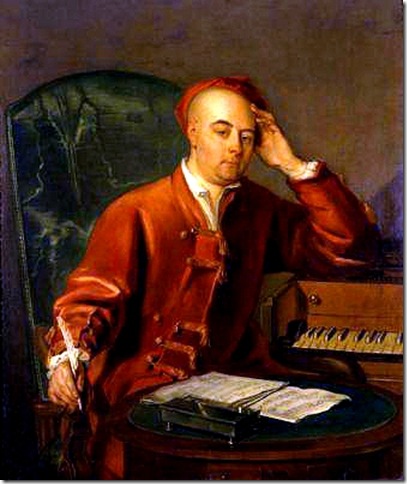Some of the most satisfying concerts of Seraphic Fire’s now-substantial history have included the music of George Frideric Handel.
In addition to its regular holiday run-throughs of the Christmas portion of the Baroque composer’s Messiah, there have been revelatory readings of his oratorio Israel in Egypt, and five years ago, a lovely reading by a chamber spinoff of some of the composer’s other vocal works, including a couple of the Nine German Songs.
This past Nov. 8 at Fort Lauderdale’s All Saints Episcopal Church, accompanied for the first time by the New York-based Baroque instrumental ensemble The Sebastians, Seraphic Fire presented Handel’s Dixit Dominus, his first mature composition, on a concert along with Antonio Vivaldi’s Gloria and the “Winter” concerto from the same composer’s Four Seasons.
The Handel performance that Saturday night ranks as an early-season highlight, a best-of before the best-of lists, a splendid realization of a great work of musical art. By contrast, the Vivaldi that came before it was expert without being very exciting, lovely and charming though it was.
The “Winter” concerto opened the concert, with Sebastians founder Daniel Lee as the soloist. The Sebastians adhere to Baroque performance practice, which means gut strings, period bows and lowered pitch. There was a great deal of tuning that had to go on before all the pieces on the program, in part because unlike the metal strings of today, gut strings tend to go out of tune far more often.
Lee plays with ferocity and brilliance, and his showy style was much appreciated by the large audience. But his intonation was often out of whack with the rest of the ensemble, and in his wish to make a bravura presentation of the work, he tended to hack at his instrument and smudge the individual notes of the fast runs that festoon this hugely popular concerto. If Lee’s playing was ultimately unsatisfying, it was nevertheless thrilling to hear the band play that famous rat-a-tat melodic signature and be reminded why this work is such fun.
Vivaldi’s Gloria is a staple of professional and community choirs everywhere, not least because of its abundant melodicism and relative ease of performance compared to the Handel that took up the second half. Choir founder and director Patrick Dupré Quigley led a Vivaldi with plenty of drive and tender contrast, though the overall effect was modest and well-mannered. Both the Sebastians and the choir did their jobs admirably well, with a rich blend from the singers and a youthful, vigorous accompaniment from the orchestra.
Two of the individual numbers provided the high points: Sopranos Estelí Gomez and Megan Chartrand harmonized with delicate beauty in the “Laudamus te” (one thought of how well they would do Delibes’s “Flower Duet,” from Lakmé), and soprano Margot Rood was a standout in the “Domine Deus.” Rood’s voice has a cool-water kind of clarity that helps her project this music with a timeless sound; oboist Debra Nagy was an excellent soloist and partner to Rood in this well-loved aria.
And when it came time for Handel’s Dixit Dominus in the second half of the program, another soprano duet, that of Gomez and Jolie Greenleaf, was the exquisite emotional apex with their reading of “De torrente,” a deeply beautiful meditation on the words from Psalm 110 in which a triumphant, conquering Lord drinks of a brook by the road. Gomez and Greenleaf, standing on either side of Quigley, echoed each other’s phrases with poignant sensitivity as the men of the choir intoned the second line of the text repeatedly in hushed, somber unity.
It’s in these moments from the whole setting that the young Handel — he was 22 and living in Rome when he completed the piece — shows his merit as a composer, with a feeling for texture and drama that reaches well into the future and that marks an advance on the work of Vivaldi (a slightly older composer whose Gloria was written eight years after the Dixit Dominus). The work fairly explodes with youthful vigor and huge contrapuntal vocal challenges, but Seraphic Fire was more than up to it, aided by sensible tempi and marvelous, committed playing by the Sebastians. This was a terrific performance in all respects, riveting in its power and drama, and superbly sung.
It was during the closing “Gloria,” with its repeated octave leaps and florid fugal subjects, that you could hear how far this choir has come since its beginning 12 years ago. When everyone in the church was singing and playing all-out, rendering this 307-year-old choral masterpiece in all its refulgent glory, it was possible to luxuriate in the sound and be aware that what began as a modest wish for a singing group had morphed into an organization that could fully realize a long-vanished musical world and make it fresh, vital and eternally green.
That’s no small feat, and it means concertgoers looking for a transcendent musical experience this season might be able to find it when the Sebastians return early next year to join with Seraphic Fire to explore the beauties of Haydn’s Lord Nelson Mass and the church music of Mozart and his predecessors.
Seraphic Fire’s annual candelight Christmas concerts are scheduled for Dec. 10-16 at four different venues in Broward and Miami-Dade counties. The Dec. 10, 12 and 14 concerts are sold out, but seats remain for Dec. 11 at St. Philip’s Episcopal in Coral Gables, Dec. 13 at All Souls Episcopal in Miami Beach, and Dec. 16 at All Saints Episcopal in Fort Lauderdale. For tickets and more information, call 305-285-9060 or visit www.seraphicfire.org.
Editor’s note: The posting of this review was delayed by technical difficulties.
